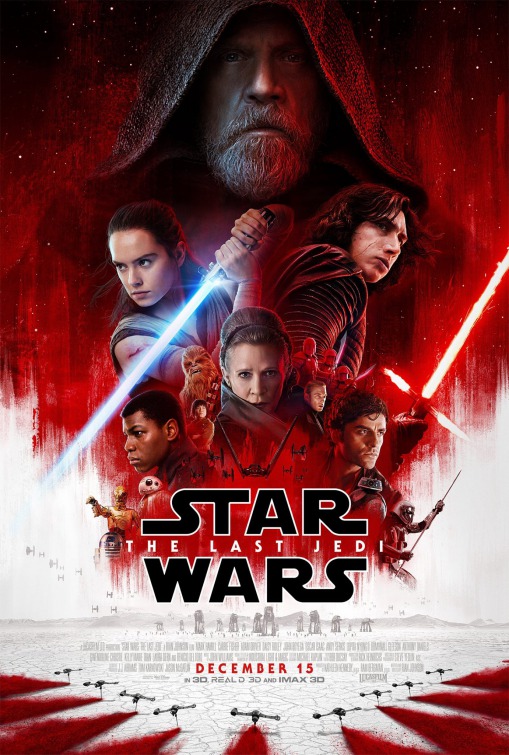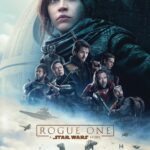A Long Time Ago, In A Galaxy Far Far Away
Director
Rian Johnson
Starring
Daisy Ridley
Adam Driver
Mark Hamill
John Boyega
Kelly Marie Tran
Oscar Isaac
Carrie Fisher
Laura Dern
Set almost straight after the events in The Force Awakens, the story is immediately split into three segments. The first story is Rey [Ridley] seeking tutelage from Jedi Master Luke Skywalker [Hamill]. Living in self-imposed exile Luke is reluctant to train Rey after what he believes is his failure: training Kylo Ren [Driver]. Meanwhile the rebel forces are trying to evacuate their base when the First Order fleet arrives and attempts to wipe the resistance out once and for all. General Leia [Fisher] and her forces perform a desperate attack headed by ace pilot Poe Dameron [Isaac]. Finally getting away, our heroes learn that the First Order have a method of tracking a ship in hyperspace, meaning there is nowhere to hide and fuel is running out. Waking from his coma, Finn’s [Boyega] only priority is finding Rey so tries to separate himself from the battle. Caught in the act by low-ranking maintenance personality Rose [Tran], a plan is devised to break aboard the enemy ship and disable the tracker but in order to do this, they will need a master codebreaker. Subsequently, Rose and Finn sneak away from the battle and seek help to turn the tide of the battle.
First, a disclaimer. While it is more than possible to write a spoiler free review, to get to the crux of why this film is both brilliant and godawful, we need to discuss everything at great length. Subsequently, this review will both defend The Last Jedi and talk down those who think it’s the second coming. If you’re desperate for a spoiler free summation, carefully skip ahead to the final short paragraph.
From the very get go The Last Jedi maintains the Force Awakens’ original trilogy parallels; being one of the biggest complaints (that it was a literal re-run of the original Star Wars) I’m genuinely surprised by this. We open on a Rebel/Resistance evacuation from an alien world while Imperial/First Order forces arrive and decimate a sizeable chunk of the fleet before being pursued. Admittedly, there are a few obvious differences, such as the comedy-heavy leanings and the planet isn’t new therefore doesn’t need establishing but the bulk of the premise remains and expands to encompass the entire film. To anyone wanting to challenge this, I’d say that despite what people may or may not remember, The Empire Strikes Back isn’t fun, it’s a long, hard watch with an ongoing chase and a spiritual training montage; in many ways – structurally, specifically – this is pretty much the same yet I feel fans will not be able to immediately draw that comparison for one reason and one reason only: nostalgia.
The key thing to take away from this release is highlighting the differences between the directors helming each instalment. On several occasions, JJ Abrams has discussed the concept of the mystery box, the idea that if you place something in a film and withhold information about it from the audience, it piques their interest, tantalises them, drives them insane. For The Force Awakens, this was evident by the amount of questions that were raised, the new characters, the enigmas and clues. Fan speculation runs amok and deep discussions as to identities, origins and destinies are brought up. The unfortunate nature of the mystery box is that the potential outweighs the delivery and no reveal will be a) impossible to decipher or b) satisfying to all. So with all these setups and threads, Johnson was given the task of providing enough of a satisfying conclusion to sate audiences. Interestingly, Johnson is a very different type of director and does what I believe to be the right thing and not only refuses to answer the questions but outright rejects the nature of the question. As such, a simple question like “Who are Rey’s parents?” is replaced with a “What does it matter” self-analysis. This kind of overt referencing is very strongly present in Johnson’s previous features. In Brick he sets a typical film noir in a high school and has the characters openly call out the traits of noir without actually acknowledging that noir is a thing that exists. The Brothers Bloom turns all the standard tropes of heist dramas and con features on their head, while Looper distorts all the rules of what we think of as time travel narratives. In other words, giving a man like Rian Johnson a giant space opera, you’re going to get less focus on the spectacle of spaceships and laser sword fights and more a dissection of the nature of space operas and the reality of living in a universe that has been at war for generations with little end in sight, while a space religion exists that is both revered and mystical yet, curiously, kinda useless. On top of that, Johnson’s focus steps away from what fans may visually expect of a Star Wars sequel (not dissimilar to the tonal shift of The Empire Strikes Back), still delivering eye-watering scale but loading it with subtle nuance, betraying his independent roots. In a way, this is no different to George Lucas homaging both serials like Flash Gordon and aping Akira Kurosawa’s characters and editorial style. Case in point, the introduction to the casino feels like a beautiful send up of the bar shot in Wings. For those unfamiliar, Wings was the first film to win the Best Picture Oscar and contains a revolutionary shot which pushes through a busy bar, setting up little mini-vignettes before finishing on our lead character. Similarly, we get a feel for the casino as the camera pushes through, introducing us to all manner of aliens and the games they are betting on, before finally arriving on a close-up of Finn soaking in this luxurious strange world. In truth, it’s also a recreation of the cantina scene from Star Wars and, to my mind, works better than Abram’s effort with Maz’s bar in The Force Awakens. More than that, the main threat of the plotline is effectively a slow chase through space. While most fans feel that Star Wars should resemble a World War II aerial dogfight, I’ve always favoured Star Trek’s naval approach and The Last Jedi finally adopts this with a film that could quite easily be adapted as a story of a seventeenth century privateer/pirate ship evading the British navy. The diversions, firing over the bow, using the environment and lesser ships as distractions because our wily heroes know more about the territory than the arrogant belligerent force – it’s like Hornblower in space. But, once again, that’s not how fans think of Star Wars.
Which brings us to the statement that saves this film; for all its flaws and failings, I believe this particular statement elevates and almost compensates for any faults. In an era of safe franchise films this feature is bold. Not every idea comes to fruition and its reach exceeds its grasp but at least it’s trying something new. Subsequently, the complaints that The Force Awakens was derivative and predictable are countered by this film’s impossibly unforeseeable, almost quixotically whimsical, narrative. True, many of Abrams’ setups have been written out leaving certain characters feeling moot and hollow but what we are left with feels fresh. To say this is the middle of a trilogy feels almost like a disservice. If anything, it feels more like the start of a trilogy, a new beginning with brave new prospects and an unknowable future, wiping the validity and arguing points of those aforementioned conversations and forums, leaving The Force Awakens as more of a bridge than a launch-pad. I mentioned that this film will suffer because of how it utilises nostalgia (notably nostalgia for things that aren’t Star Wars) but I genuinely believe this is a good thing. While The Force Awakens served to remind audiences that a Star Wars could be great cinema, The Last Jedi leaves you with questions, confusion and hope for the future. More accurately, it leaves you adrift, feeling that the universe you thought you knew inside out has changed. For many change will scare them and they will pine for features like Rogue One and for those people there will no doubt be plenty of anthology stories retreading the same ground over-and-over. But like a child leaving their parent’s home for the first time, that difference, that change is both exciting and terrifying. Last year I commented that Rogue One went one step too far in terms of homage and while it was heralded by many at the time as a warm experience, with others proclaiming it their favourite, it is easily the most flawed of the new wave releases because of its lack of vision and standalone unique originality. In truth, both Rogue One and The Force Awakens gave fans the familiarity they wanted whereas The Last Jedi gives them the unorthodox subversion and future direction they and the series need to survive – and for that, many will reject it. But the truth of whether this experiment works or not will only be revealed in Episode IX.
Stepping away from themes and undercurrents for a second, let’s talk characters. Porgs are amazing. A construct of unabashed marketing and manipulation that holds its hands aloft and decries blame. Scary movies manipulate you into being scared, comedies manipulate you to laugh, Porgs manipulate you to go “Aww.” And they’re fucking great. Now that’s out of the way, on to the cast. Again, subverting the expected, the central trinity here is Rey, Kylo and Luke, all of whom seem dead-set on taking everything that came before and abandoning or dismantling it – to the degree that Kylo even says, “Let the past die.” But I’ll save my comments on Rey and Kylo for later, suffice it to say they are very divisive characters that fans will either love or loathe. But let’s talk about Luke Skywalker for a minute, the man who was the subject of much discussion in The Force Awakens, only to appear for a handful of mystifying seconds. This release spends a great deal of time replicating Empire’s Dagobah setting with Luke living the simple life of a hermit, much like Obi Wan and Yoda.. but with more alien milking. But once the training finally begins, Skywalker becomes a fascinating character, transitioning from impetuous child to wizened sceptical old man. His disenfranchisement with the idea of the Jedi is wonderful; a sobering look at the peoples he trained to emulate whose legacy he planned on furthering and in some way, a fair and damning look at the absurdity of the canon and most specifically the mythology of the prequels. Calling them out for the Jedi order’s bloated uselessness at the height of their power, allowing a Jedi master to train his father, the man who would become the face of the most ruthless tyrannical ruling of their galaxy, is an exceptionally bold move because if there’s any unspoken rule in each previous Star Wars instalment, it’s that the lore is sacrosanct. Having that logically challenged is absolutely what’s needed. The story then takes that to the next level with the presence of Yoda reminding us that for all Luke’s confidence and supposed wisdom, he’s still the same foolish child. As I said earlier, Johnson likes defying expectation while simultaneously outright telling audiences what to expect. In an interview before the film came out, the mystery of who the eponymous last Jedi could be was unceremoniously dismissed with a simple “it’s Luke.” Equally, in the narrative, Luke himself challenges Rey’s (and the audience’s/fan’s) presumptions stating that this won’t go the way she thinks and does she expect the great Luke Skywalker to simply “show up with his laser sword and take down the whole First Order” and the answer is obviously yes, that’s exactly what people want – but then the film both does and doesn’t deliver just that which is frankly masterful. I’ll expand on that more at the end of my review. Dealing with the last of the old-guard trinity, we need to talk about Leia. While it’s quite evident that this new trilogy was supposed to have each instalment focus on Han, then Luke, then Leia, this has been quite clearly scuppered by the untimely death of Carrie Fisher and the decision to (potentially) not include her in Episode IX. Having said that, there are a handful of elements that set up the transition of her departure and after all the criticisms Fisher received in her last appearance, I would say this performance is a distinct improvement. Things like the subtle reactions to the cost of victory over the dreadnaught and her brazen attitude toward those who follow her is very pleasing. I.. er.. still don’t think I liked her CGI space-wizard flyby but the less said about that the better.
Moving on to the next generation of characters, I love the fact that the fleet is comprised of a generous portion of women and minorities. This representation is something that has been missing from contemporary cinema in general and dates older releases with every passing feature. At the head of that fleet is ace pilot Poe Dameron and The Last Jedi wastes no time reminding us exactly how and why Poe is the best pilot in the galaxy. But bringing the character forward, Poe’s rash and impulsive actions, while securing temporary victory over a single battle, do not show the wisdom and big-picture-thinking that a general would need to display. As the film progresses, Poe continues his flyboy attitude but through sacrifice and a touch of humility, he heads closer to being more than just a cocky glory-hunting hero, with Leia going so far as to say “Why are you looking at me? Follow him.” Having said that, I would say that may be a little undeserved. As great as Poe is, the introduction of Resistance Vice Admiral Holdo [Dern] is great, she has little time or tolerance for some jumped-up little pilot who feels his skills merit him having a seat at the table for every strategic conversation. Regrettably, while creating this strong leader and, let’s be honest, a wonderful Leia successor, they remove her in a sacrificial act. One I’ll come back to later. The other main plot thread, aside from the chase and the Jedi revelations is the one that will possibly receive the most flak for being largely filler. Finn awakes from his coma and continues his roguish, charming exploits, growing more honourable as we go. Along for the ride this time is impressionable engineer, Rose, who is still grieving the sister she lost in the film’s opening battle. While these two and their mission initially feels like a bit of an unnecessary diversion to spice up the visuals, add some variety and just give a prominent character something to do, it serves to raise some genuinely interesting talking points about war, duty and loyalty. From the outset we are shown that Rose’s sister is a hero, without her, Poe’s plan would have been for nought and the dreadnaught will still be active. By the end of the film, that heroic gesture is turned on its head; while Rose’s sister’s sacrifice still secured a powerful blow against the First Order, Rose’s actions feel discordant, erratic and ultimately unhelpful. She doesn’t secure the codebreaker, her actions lead to the fleet’s plan being exposed and she stops Finn from performing an action which would take out the First Order’s main gun. So why does she work? Why do I like her? To put it simply, because she’s right. Rose nearly kills herself stopping Finn and it seems reckless and stupid until she explains why: that in order to win this war, it has to be saving the people you love, otherwise what’s the point? Furthermore, the final shots of the film with that beautifully subtle force-nod shows a child inspired to look up from his downtrodden setting thanks to his brief encounter with the woman who showed him the universe can be a better place. If that isn’t the most mature and aware Star Wars character (and not in that “I can see you future” bullshit way), I don’t know who is.
But for all my defence of this feature and heralding as this deep and profound feature, it has moments of remarkable stupidity. Snoke finally looks pretty good but holy crap he’s a wasted character, same with Phasma. I get the logic of dismissing all these setups but without any form of closure, we are just left with a conveyor belt of disposable faces who failed on the promise of satisfying intrigue and reveal. But to be fair, did we really need more to cover? Cramming so much into this film leaves, among other things, crazy pacing issues. While the editing, score work and directing should be praised for making this mammoth undertaking palatable, it’s frankly too much Star Wars and it is both overwhelming and stifling. This lack of methodical allowance for processing also means that things like trying to blur the lines of good and evil with mention of devil’s advocate weapons dealers is lost when the film speeds toward its conclusion with the standard good/evil split; albeit by another name according to Kylo Ren. Speaking of good and bad, I was filled with such confusion when Holdo sacrifices herself by jumping to light-speed through the pursuing First Order fleet. On the one hand, that shot and the sound design of its impact may possibly be the most beautiful shot of any Star Wars film. Having said that, for all its breath-taking spectacle, it raises a lot of questions, specifically, knowing going to hyperspace could have saved everyone weakens Holdo’s sacrifice because surely she could have done it sooner – or are we to believe this is the first instance of this happening? Who knows? It’s not addressed. Then there’s the bloody force ghosts and their force powers. I hate the force ghosts. HATE THEM! From a practical filmmaking level, an actor being an unaging spectre causing no end of difficulty and the fact that entities exist that can offer indispensable omnipotent advice from the other side yet do next to nothing is absolutely infuriating. So obviously Yoda turning up saying prophetic brilliance like “The greatest teacher failure is” will delight fans but pisses me off no end; no matter how poignant his words are. Finally, one of the biggest negatives of all these Disney Star Wars films is they don’t appear to say or do much, they build on what has come before but don’t stand above them which means they will always have a shadow cast over them.
As stated at the very start of this review, I will happily defend this film for the forward-looking, bold filmmaking that it is but I can’t escape the fact that it stumbles occasionally, although never to the extent of the prequels. But I would maintain all this is a positive because the conversation it generates is more interesting. Suddenly the playing field is even and the coming films are truly unknown. Of course, this puts a lot of pressure on what’s to come to meet these newly established possibilities but for the time being, I would posit this is a good film – if only for the very fact that a good film should challenge you and create within you a sense of marvel, a sense of questioning ones’ own existence, a sense of familiarity and a sense of ..conflict.
Release Date:
15th December 2017
The Scene To Look Out For:
The return of Luke Skywalker was more than worth the wait. Mark Hamill returns to the franchise grown as an actor, offering a range in his performance as yet unseen in the character. Nowhere is that more present than his final showdown. Admittedly, I muttered an observation to my wife which ruined the reveal but it’s still a really nice development. As described earlier in the film, “the great Luke Skywalker” miraculously appears at the rebel’s worst hour and impossibly stands down an entire army. Later it is revealed that this is merely an astral projection, a distraction allowing the rebels to escape. But the clues are beautiful, to the degree that you would wonder how you never saw them beforehand, from his younger appearance, surviving the First Order’s barrage, possessing the lightsaber which we saw explode not a few scenes before and finally the footprints in the salt desert. Great filmmaking and a truly great send off.. were it not for those fucking force ghosts!!
Notable Characters:
Kylo and Rey are fantastic characters, deep and complex, new and exciting, yet somehow archetypal in their execution. Many fans will hate them for multiple reasons – most of which boil down to “they’re not what I already know” – but seeing them executing the decisions they make, debating the choices before them and suffering the consequences of their actions is fantastic. They are very much the same split soul, trying to find their place in the universe while being pulled back and forth by individuals pushing their own agendas. The linked conversations, being manipulated by their masters, coming together to fight against those who would choose to control them, only to fall apart again at the last minute. The potential is agonising and the pay-off can only end in heartbreak.
Highlighted Quote:
“I wish I could put my fist through this whole lousy beautiful town”
In A Few Words:
“Arguably one of the most divisive Star Wars features which will pit fans against critics, purists against progressives and what is against what could be”
Total Score: 4/5

![The Red Right Hand Movie Reviews [Matthew Stogdon]](https://reviews.theredrighthand.co.uk/wp-content/uploads/2021/12/cropped-header1.png)



